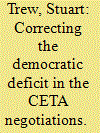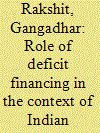| Srl | Item |
| 1 |
ID:
124728


|
|
|
|
|
| Publication |
2013.
|
| Summary/Abstract |
The federal government claims that the Canada-EU Comprehensive Economic and Trade Agreement (CETA) negotiations have been the most transparent and participatory in Canadian history. Labour, environmental, social justice, and other civil society groups that are critical of the proposed agreement for various reasons would argue that their perspectives have been excluded from the official federal dialogue. This article looks at some of the efforts of non-governmental (civil society) actors, and in particular the Trade Justice Network and its member organizations, to affect the CETA negotiations in other ways, with an emphasis on contact with provincial governments, municipalities, European decision makers, and other non-governmental groups in Canada and Europe. It is argued that the exclusion of critical views shows an inherent democratic deficit in the CETA negotiations that privileges corporate insiders at the expense of civil society, the public, and even elected officials. Notwithstanding this deficit, the success of the civil society campaigns can be seen in the problem areas delaying a successful conclusion of negotiations, including new public procurement restrictions for Canadian municipalities and pharmaceutical patent term extensions. For the Trade Justice Network, these areas also help explain how the agreement narrows the fields of economic, environmental, and social governance in Canada.
|
|
|
|
|
|
|
|
|
|
|
|
|
|
|
|
| 2 |
ID:
092928


|
|
|
|
|
| Publication |
2009.
|
| Summary/Abstract |
The last six-party talks ended in December 2008. The inactive period coincided with a serious recession in the United States that led to annual budget deficits for fiscal years 2008-2009 and 2009-2010 that easily exceeded $1 trillion. The United States will not be in a position to offer meaningful economic concessions to North Korea. Further, the removal of North Korea by the United States from the list of state sponsors of terrorism in 2008 is symbolic because there are numerous other sanctions still in effect against North Korea. The road map toward successful negotiations will have to be composed of comprehensive plans in which both North Korea and the United States can see what the ultimate outcome of their concessions is likely to be.
|
|
|
|
|
|
|
|
|
|
|
|
|
|
|
|
| 3 |
ID:
092719


|
|
|
| 4 |
ID:
040338


|
|
|
|
|
| Publication |
Calcutta, The World Press Private Ltd., 1973.
|
| Description |
xiv,171p.
|
|
|
|
|
|
|
|
|
|
|
|
Copies: C:1/I:0,R:0,Q:0
Circulation
| Accession# | Call# | Current Location | Status | Policy | Location |
| 011371 | 338.954/RAK 011371 | Main | On Shelf | General | |
|
|
|
|